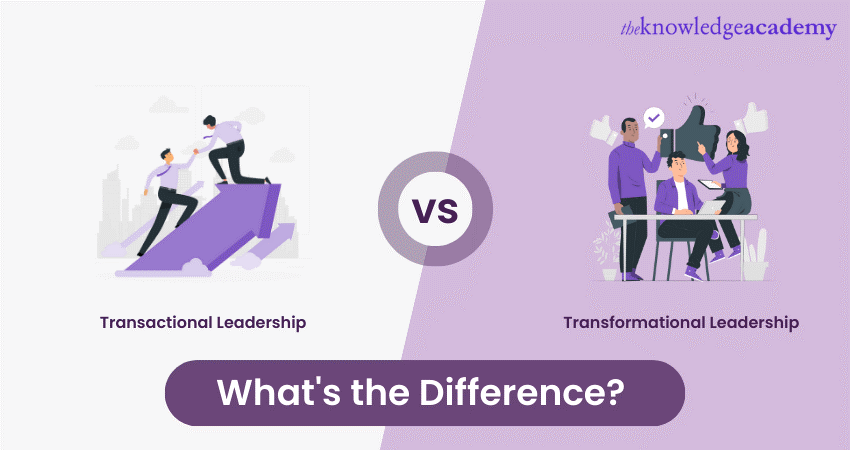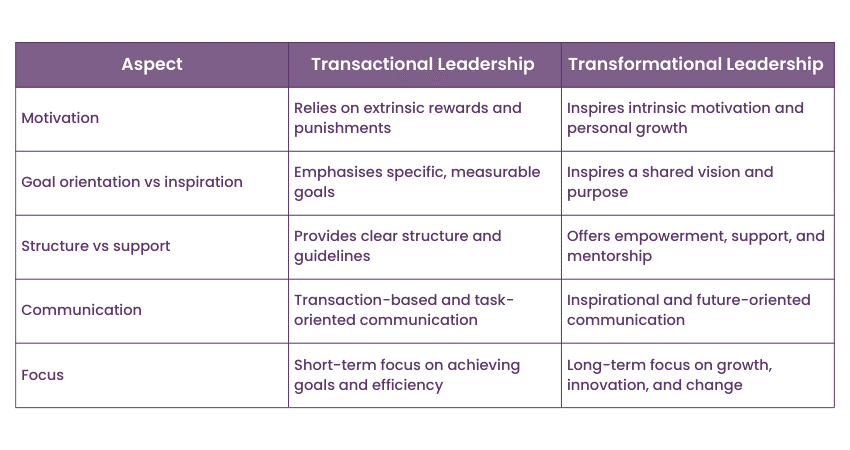We may not have the course you’re looking for. If you enquire or give us a call on 01344203999 and speak to our training experts, we may still be able to help with your training requirements.
Training Outcomes Within Your Budget!
We ensure quality, budget-alignment, and timely delivery by our expert instructors.

Leadership plays a crucial role in guiding organisations towards success. This is why different Leadership styles have emerged over the years, each with its unique characteristics and impact on the workplace. Two prominent Types of Leadership Styles often discussed in management are Transactional Leadership vs Transformational Leadership.
The differences between the two make them a topic of discussion among the professionals. It also creates confusion about which one to choose. Thus, it’s crucial to learn about the differences between the two and select the best that suits your style. So, read this to explore the comparative analysis of Transactional vs Transformational Leadership and gain insights into their key differences and their impact on effective Leadership.
Table of Contents
1) What is Transactional Leadership?
2) What is Transformational Leadership?
3) Transactional vs Transformational Leadership: Key differences
a) Motivation
b) Goal orientation vs inspiration
c) Structure vs support
d) Communication
e) Focus
4) Conclusion
What is Transactional Leadership?
A Transactional Leadership style adheres to a managerial philosophy centred on reinforcement and exchanges, whereby employees are managed by setting precise objectives and offering rewards for their attainment. This exchange of goals and rewards is the essence of Transactional Leadership. Effective Transactional Leaders promptly acknowledge and reward their followers' achievements.
A study published in Psychiatric Services noted that Transactional Leadership is considered more pragmatic because of its focus on meeting specific targets and objectives. Therefore, Importance of Leadership cannot be underestimated.
Transactional leaders are frequently found in sectors like manufacturing, where production line workers are expected to meet specific production quotas per shift. Another domain where a Transactional approach is advantageous is in sales, where both team and individual members are striving to attain specific sales targets. Transactional Leadership can also be highly effective in situations where teams are working under tight time constraints to complete a project or when financial resources are limited.
Transactional Leadership often aligns with maintaining established actions and processes that have proven to be successful. It is most suitable for self-motivated employees who do not require inspiration from their managers or company executives, making it a Leadership style more commonly employed in well-established companies.
What is Transactional Leadership?
The Transformational Leadership style is firmly rooted in four key components, often referred to as the four "I's" of Transformational Leadership:
1) Intellectual stimulation: Encouraging fresh experiences and novel ways of thinking, both for themselves and their employees.
2) Individual consideration: Providing guidance and support for the professional growth of employees through mentoring.
3) Inspirational motivation: Instilling a vision for the organisation that employees embrace and internalise as their own.
4) Idealised influence: Serving as role models, exemplifying the conduct they expect from their employees.
As the four "I's" outline, Transformational leaders are dedicated to nurturing and positively motivating their workforce. Instead of micro-managing, they cultivate an autonomous work environment that fosters creativity, encourages innovative thinking, and empowers employees to make their own decisions in their tasks.
Transformational leaders place a strong emphasis on personal and professional development, urging all employees to think innovatively when tackling persistent challenges. However, their impact is often most profound when leading younger employees, aiding their assimilation into the company culture and fostering a sense that their work is a part of something unique.
This Leadership style thrives in organisations or teams whose objectives encompass employee skill development rather than meeting immediate production quotas or sales targets.
Transformational Leadership is often the preferred approach in settings where a product or service is novel
While various constraints and quotas may still be in place—such as limited financial resources, strict deadlines, and specific production targets—when dealing with a new product or a start-up company, the "rules" and processes are not yet established. In such cases, there is a need for open and innovative thinking on how to produce, grow, survive, and thrive, and this kind of thinking is not only necessary but also anticipated.
Before we dive into the comparison of Transformational vs Transactional Leadership, we will first understand both. Transactional Leadership is a Leadership style that emphasises the exchange of rewards and punishments between leaders and their followers to motivate performance and achieve set goals. Let's explore the characteristics, benefits, and limitations of Transactional Leadership in more detail.
Enhance your Leadership and management skills by joining our Leadership and Management Skills Course!
Transactional vs Transformational Leadership: Key differences
Now that we have defined both Transformational vs Transactional Leadership, let’s look at the difference between Transformational and Transactional Leadership. Here's a detailed explanation of the difference between Transactional and Transformational Leadership styles:

Motivation
Transactional leaders primarily motivate their team members through a system of rewards and punishments. They establish clear expectations and performance metrics and reward those who meet or exceed targets. Punishments or corrective actions are applied to individuals who fail to meet expectations. This Transactional approach hinges on extrinsic motivation.
Transformational leaders primarily motivate their team members through intrinsic motivation. They inspire and engage their followers by appealing to their higher-order needs, such as personal growth, self-actualisation, and a sense of purpose. They create a supportive and empowering environment that encourages individuals to contribute their best.
Goal orientation vs inspiration
Transactional Leaders are highly goal-oriented. They set specific and measurable targets for their team members to achieve. These goals are often aligned with the organisation's objectives and may be tied to rewards or bonuses.
Transformational Leaders have a clear vision for the future and effectively communicate this vision to their followers. They inspire and energise their team by articulating a compelling vision which resonates with their values and aspirations.
Structure vs support
Transactional Leaders provide a structured work environment where roles, responsibilities, and expectations are clearly defined. They establish standard operating procedures and protocols, ensuring that employees adhere to established guidelines.
Transformational Leaders empower their team members by delegating responsibilities, providing autonomy, and creating opportunities for growth and development. They offer support, mentorship, and guidance to help individuals reach their full potential.
Communication
Communication in Transactional Leadership is primarily transaction-based. Leaders provide feedback, guidance, and instructions related to specific tasks or goals. They expect team members to follow instructions and meet performance targets.
Communication in Transformational Leadership is inspirational, motivational, and future-oriented. Leaders use storytelling, metaphorical language, and vivid imagery to effectively convey their vision and engage their followers emotionally.
Long-term focus
Transactional Leadership tends to have a short-term focus, emphasising immediate results and meeting targets. The primary objective is to ensure efficient operations and goal achievement in the short run.
Transformational Leadership emphasises long-term focus on organisational growth and development. Leaders focus on fostering innovation, promoting a learning culture, and adapting to change. They encourage their team to think beyond immediate goals and strive for continuous improvement.
Want to unlock your Leadership potential? Sign up for our Leadership Skills Course now!
Conclusion
In conclusion, Transactional and Transformational Leadership are two distinct styles that impact organisational dynamics differently. Transactional Leadership provides structure and clarity, while Transformational Leadership inspires and motivates followers, encouraging innovation and adaptability. Choosing the right Leadership style depends on the situation, organisational culture, and desired outcomes. Hope we can provide you with the detailed comparison of Transactional vs Transformational Leadership that you were looking for!
Take your Leadership skills to the next level by signing up for our Leadership Training today!
Frequently Asked Questions

Transactional Leadership skills are well-suited for management roles and positions emphasising quality control and compliance. These skills excel in environments requiring efficiency, procedure adherence, and day-to-day task management.
Conversely, Transformational Leadership skills open doors to executive positions, innovation and research roles, entrepreneurship, and human resources and organisational development careers. Individuals with these skills thrive in shaping corporate vision, fostering creativity, and inspiring teams for higher performance. Consulting roles are also typical, where their expertise guides organisations through significant transformations.

Transactional Leadership skills propel career progression through their focus on efficiency, reliability, and financial accountability. These skills are helpful in making individuals well-suited for promotions in established hierarchies and roles demanding operational excellence. On the other hand, Transformational Leadership skills drive professional success by fostering innovation, adaptability, and organisational growth. Those with Transformational skills excel in strategic vision, change management, and entrepreneurial opportunities, positioning themselves for executive roles and unique career paths.

The Knowledge Academy takes global learning to new heights, offering over 30,000 online courses across 490+ locations in 220 countries. This expansive reach ensures accessibility and convenience for learners worldwide.
Alongside our diverse Online Course Catalogue, encompassing 17 major categories, we go the extra mile by providing a plethora of free educational Online Resources like News updates, blogs, videos, webinars, and interview questions. Tailoring learning experiences further, professionals can maximise value with customisable Course Bundles of TKA.
The Knowledge Academy’s Knowledge Pass, a prepaid voucher, adds another layer of flexibility, allowing course bookings over a 12-month period. Join us on a journey where education knows no bounds.

Explore Leadership and Management Course with The Knowledge Academy, where more courses await, including Staff Motivation Training, Leadership Skill Training, and Decision Making Training. Tailored for various skill levels, these courses offer in-depth insights into Strategic workforce planning and methodologies.
Dive into our Business Skills blogs a trove of resources covering Leadership topics. Whether you are a beginner or aiming to enhance your Leadership and Management skills, The Knowledge Academy's diverse courses and insightful blogs are your go-to source.
Upcoming Business Skills Resources Batches & Dates
Date
 Successful People Management and Team Leadership
Successful People Management and Team Leadership
Fri 2nd Aug 2024
Fri 4th Oct 2024
Fri 6th Dec 2024
Fri 14th Feb 2025
Fri 16th May 2025
Fri 25th Jul 2025
Fri 29th Aug 2025
Fri 10th Oct 2025
Fri 28th Nov 2025







 Top Rated Course
Top Rated Course



 If you wish to make any changes to your course, please
If you wish to make any changes to your course, please


